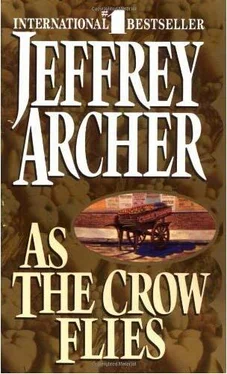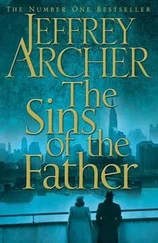Charlie dropped his slice of birthday cake back onto his plate and looked across at Mr. Baverstock. "Good heavens, she's right, you know."
"She certainly may not be wrong," admitted Baverstock, shuffling uneasily in his chair. "And I apologize for my lack of imagination, because as Lady Wiltshire rightly points out I've been a blind fool by not following my master's instructions when he advised me to use my common sense. He so obviously worked out that Guy might well have fathered other children and that such offspring were most unlikely to be found in England."
"Well done, Mr. Baverstock," said Daphne. "I do believe I should have gone to university and read for the bar."
Mr. Baverstock felt unable to correct her on this occasion.
"There may still be time," said Charlie. "After all, there's another six weeks left before the inheritance has to be handed over, so let's get straight back to work. By the way, thank you," he added, bowing towards Daphne.
Charlie rose from his chair and headed towards the nearest phone. "The first thing I'm going to need is the sharpest lawyer in Australia." Charlie checked his watch. "And preferably one who doesn't mind getting up early in the morning."
Mr. Baverstock cleared his throat.
During the next two weeks large box advertisements appeared in every newspaper on the Australian continent with a circulation of over fifty thousand. Each reply was quickly followed up with an interview by a firm of solicitors in Sydney that Mr. Baverstock had been happy to recommend. Every evening Charlie was telephoned by Trevor Roberts, the senior partner, who remained on the end of the line for several hours when Charlie would learn the latest news that had been gathered from their offices in Sydney, Melbourne, Perth, Brisbane and Adelaide. However, after three weeks of sorting out the cranks from the genuine inquirers Roberts came up with only three candidates who fulfilled all the necessary criteria. However, once they had been interviewed by a partner of the firm they also failed to prove any direct relationship with any member of the Trentham family.
Roberts had discovered that there were seventeen Trenthams on the national register, most of them from Tasmania, but none of those could show any direct lineage with Guy Trentham or his mother, although one old lady from Hobart who had emigrated from Ripon after the war was able to present a legitimate claim for a thousand pounds, as it turned out she was a third cousin of Sir Raymond.
Charlie thanked Mr. Roberts for his continued diligence but told him not to let up, as he didn't care how many staff were allocated to the job night or day.
At the final board meeting to be called before Nigel Trentham officially came into his inheritance, Charlie briefed his colleagues on the latest news from Australia.
"Doesn't sound too hopeful to me," said Newman. "After all, if there is another Trentham around he or she must be well over thirty, and surely would have made a claim by now."
"Agreed, but Australia's an awfully big place and they might even have left the country."
"Never give up, do you?" remarked Daphne.
"Be that as it may," said Arthur Selwyn, "I feel the time is long overdue for us to try and come to some agreement with Trentham, if there is to be a responsible takeover of the company. In the interests of Trumper's and its customers, I would like to see if it is at all possible for the principals involved to come to some amicable arrangement—"
"Amicable arrangement!" said Charlie. "The only arrangement Trentham would agree to is that he sits in this chair with a built-in majority on the board while I am left twiddling my thumbs in a retirement home."
"That may well be the case," said Selwyn. "But I must point out, Chairman, that we still have a duty to our shareholders."
"He's right," said Daphne. "You'll have to try, Charlie, for the long-term good of the company you founded." She added quietly, "However much it hurts."
Becky nodded her agreement and Charlie turned to ask Jessica to make an appointment with Trentham at his earliest convenience. Jessica returned a few minutes later to let the board know that Nigel Trentham had no interest in seeing any of them before the March board meeting, when he would be happy to accept their resignations in person.
"Seventh of March: two years to the day since the death of his mother," Charlie reminded the board.
"And Mr. Roberts is holding for you on the other line," Jessica reported.
Charlie rose and strode out of the room. The moment he reached the phone he grabbed at it as a drowning sailor might a lifeline. "Roberts, what have you got for me?"
"Guy Trentham!"
"But he's already buried in a grave in Ashurst."
"But not before his body was removed from a jail in Melbourne."
"A jail? I thought he died of tuberculosis."
"I don't think you can die of tuberculosis while you're hanging from the end of a six-foot rope, Sir Charles."
"Hanged?"
"For the murder of his wife, Anna Helen," said the solicitor.
"But did they have any children?"
"There's no way of knowing the answer to that."
"Why the hell not?"
"It's against the law for the prison service to release the names of the next of kin to anyone."
"But why, for heaven's sake?"
"For their own protection."
"But this could only be to their benefit."
"They've heard that one before. Indeed, I have had it pointed out to me that in this particular case we've already advertised for claimants from one coast to the other. What's worse, if any of Trentham's offspring had changed their name, for understandable reasons, we've little chance of tracing him or her at all. But be assured I'm still working flat out on it, Sir Charles."
"Get me an interview with the chief of police."
"It won't make any difference, Sir Charles. He won't—" began Roberts, but Charlie had already hung up.
"You're mad," said Becky, as she helped her husband pack a suitcase an hour later.
"True," agreed Charlie. "But this may well be the last chance I have of keeping control of the company, and I'm not willing to do it on the end of a phone, let alone twelve thousand miles away. I have to be there myself, so at least I know it's me who's failed and not a third party."
"But what exactly are you hoping to find when you get there?"
Charlie looked across at his wife as he fastened his suitcase. "I suspect only Mrs. Trentham knows the answer to that."
When thirty-four hours later on a warm, sunlit evening, Flight 012 touched down at Kingsford Smith Airport in Sydney, Charlie felt what he most needed was a good night's sleep. After he had checked through customs he was met by a tall young man dressed in a light beige suit who stepped forward and introduced himself as Trevor Roberts, the lawyer who had been recommended by Baverstock. Roberts had thick, rusty-colored hair and an even redder complexion. He was of a solid build and looked as if he might still spend his Saturday afternoons in a different type of court. He immediately took over Charlie's laden trolley and pushed it smartly towards the exit marked "car park."
"No need to check this lot into a hotel," said Roberts as he held the door open for Charlie. "Just leave everything in the car."
"Is this good legal advice you're giving me?" asked Charlie, already out of breath trying to keep up with the young man.
"It certainly is, Sir Charles, because we've no time to waste." He brought the trolley to a halt at the curbside and a chauffeur heaved the bags into the boot while Charlie and Mr. Roberts climbed into the back. "The British Governor-General has invited you for drinks at six at his residence, but I also need you to be on the last flight to Melbourne tonight. As we only have six days left, we can't afford to waste any of them being in the wrong city."
Читать дальше












